Yesterday, Agence France Presse photo service published a series of photographs with captions noting that “Israel took the highly unusual decision to close the Al-Aqsa mosque compound for Friday prayers, leading to anger from Muslims and Jordan, the holy site’s custodian. It remained closed on July 15, while parts of Jerusalem’s Old City were also under lockdown.”
The captions originally included not a word about Friday’s deadly attacks, in which three Arab Israeli assailants exiting the compound fired on Israeli policeman, killing two and injuring a third, and then ran back to the Temple Mount, where troops shot the attackers dead. CAMERA’s Israel office contacted AFP, pointing out that it is extremely uninformative to the point of being misleading to note the Israeli closures at the sensitive site while ignoring the fatal attacks which precipitated the unusual step. Likewise, AFP captions that noted new metal detectors were installed gave no indication about why these metal detectors were installed. By ignoring the deadly attacks, AFP’s captions left news consumers with the misimpression that Israel arbitrarily made Muslims’ lives more difficult for no apparent reason.
A sampling of the numerous misleading captions follows:
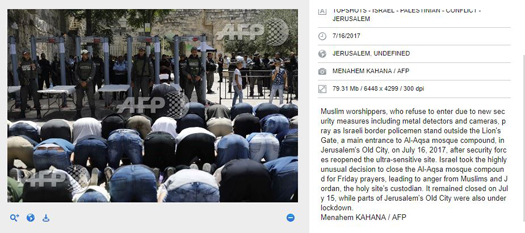
Muslim worshippers, who refuse to enter due to new security measures including metal detectors and cameras, pray as Israeli border policemen stand outside the Lion’s Gate, a main entrance to Al-Aqsa mosque compound, in Jerusalem’s Old City, on July 16, 2017, after security forces reopened the ultra-sensitive site. Israel took the highly unusual decision to close the Al-Aqsa mosque compound for Friday prayers, leading to anger from Muslims and Jordan, the holy site’s custodian. It remained closed on July 15, while parts of Jerusalem’s Old City were also under lockdown.
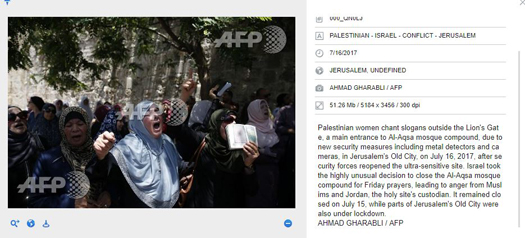
Palestinian women chant slogans outside the Lion’s Gate, a main entrance to Al-Aqsa mosque compound, due to new security measures including metal detectors and cameras, in Jerusalem’s Old City, on July 16, 2017, after security forces reopened the ultra-sensitive site. Israel took the highly unusual decision to close the Al-Aqsa mosque compound for Friday prayers, leading to anger from Muslims and Jordan, the holy site’s custodian. It remained closed on July 15, while parts of Jerusalem’s Old City were also under lockdown.
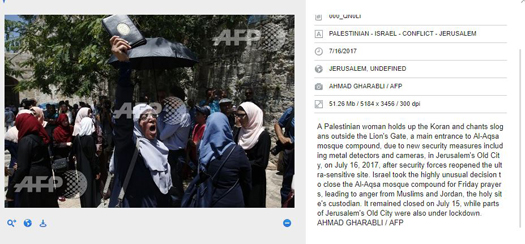
A Palestinian woman holds up the Koran and chants slogans outside the Lion’s Gate, a main entrance to Al-Aqsa mosque compound, due to new security measures including metal detectors and camera, in Jerusalem’s Old City, on July 16, 2017, after security forces reopened the ultra-sensitive site. Israel took the highly unusual decision to close the Al-Aqsa mosque compound for Friday prayers, leading to anger from Muslims and Jordan, the holy site’s custodian. It remained closed on July 15, while parts of Jerusalem’s Old City were also under lockdown.
Following CAMERA’s communication with AFP concerning the misleading captions which noted the new security measures and closures, while ignoring the deadly attacks which precipitated those measures, the news agency commendably amended all of the captions. All of the relevant captions now refer to the deadly attacks, and no longer note the less essential information regarding the anger from Muslims and Jordan, or that parts of the Old City remained under lockdown the day before.
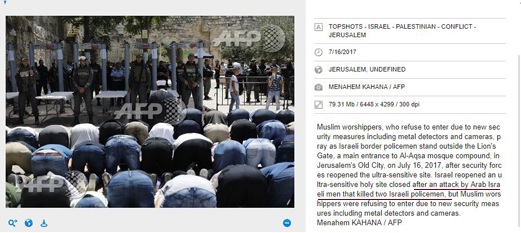
Muslim worshippers, who refuse to enter due to new security measures including metal detectors and cameras, pray as Israeli border policemen stand outside the Lion’s Gate, a main entrance to Al-Aqsa mosque compound, in Jerusalem’s Old City, on July 16, 2017, after security forces reopened the ultra-sensitive site. Israel reopened an ultra-sensitive holy site closed after an attack by Arab Israeli men that killed two Israeli policemen, but Muslim worshippers were refusing to enter due to new security measures including metal detectors and cameras. (Emphasis added.)
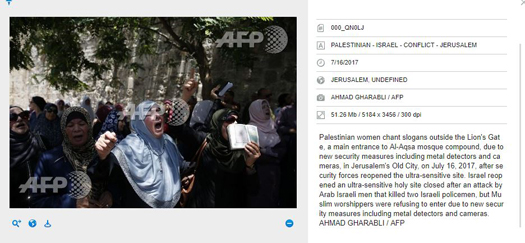
Palestinian women chant slogans outside the Lion’s Gate, a main entrance to Al-Aqsa mosque compound, due to new security measures including metal detector and cameras, in Jerusalem’s Old City, on July 16, 2017, after security forces reopened the ultra-sensitive site. Israel reopened an ultra-sensitive holy site closed after an attack by Arab Israeli men that killed two policemen, but Muslim worshippers were refusing to enter due to new security measures including metal detectors and cameras. (Emphasis added.)
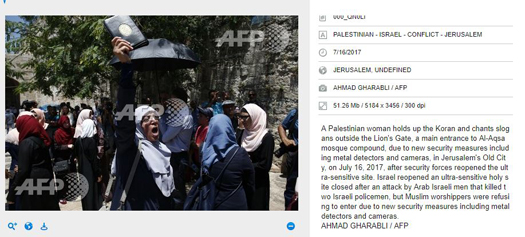
A Palestinian woman holds up the Koran and chants slogans outside the Lion’s Gate, a main entrance to Al-Aqsa mosque compound, due to new security measures including metal detectors and cameras, in Jerusalem’s Old City, on July 16, 2017, after security forces reopened the ultra-sensitive site. Israel reopened an ultra-sensitive holy site closed after an attack by Arab Israeli men that killed two Israeli policemen, but Muslim worshippers were refusing to enter due to new security measures including metal detectors and cameras.
CAMERA commends AFP for amending the multiple captions which had omitted the deadly Arab violence and which falsely portrayed Israel as arbitrarily restrictive.
For additional AFP corrections prompted by CAMERA, please see here.
